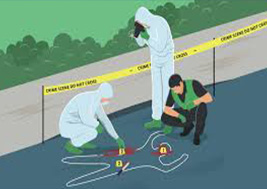Forensics Anthropology
Forensic anthropology is the examination of human skeletal remains for law enforcement agencies to help with the recovery of human remains, determine the identity of unidentified human remains, and estimate time since death. Forensic anthropology involves the application of these same methods to modern cases of unidentified human remains. Through the established methods, a forensic anthropologist can aid law enforcement in establishing a profile of the unidentified remains. The profile includes sex, age, ancestry, height, length of time since death, and sometimes the evaluation of trauma observed on bones. Forensic anthropology is a special sub-field of physical anthropology (the study of human remains) that involves applying skeletal analysis and techniques in archaeology to solving criminal cases. When human remains or a suspected burial are found, forensic anthropologists are called upon to gather information from the bones and their recovery context to determine who died, how they died, and how long ago they died. Forensic anthropologists specialize in analysing hard tissues such as bones. With their training in archaeology, they are also knowledgeable about excavating buried remains and meticulously recording the evidence. This deals with the examination of compromised human remains or skeletons to help determine the age, height, gender, and ancestry. It also helps establish the time since death by identifying and examining injuries, if any. These analyses give valuable leads to investigators on identifying victims, especially in cases where the bodies are beyond recognition.










.jpg)





















